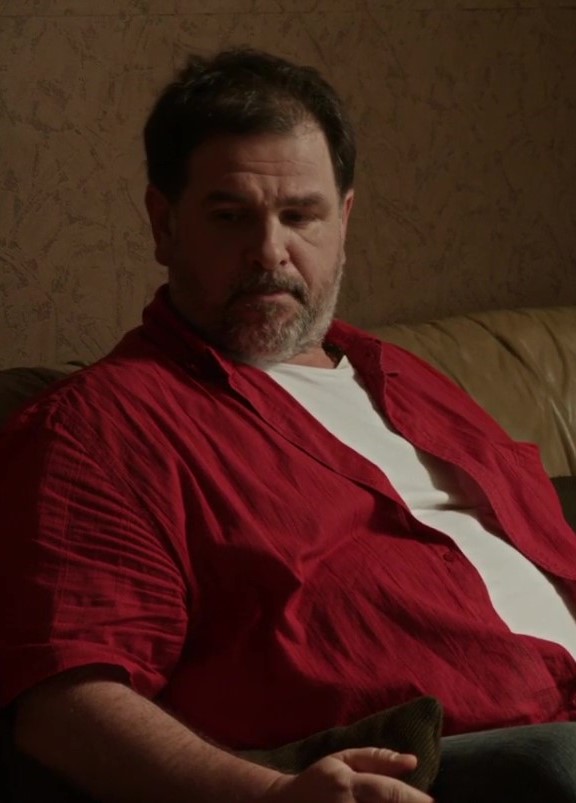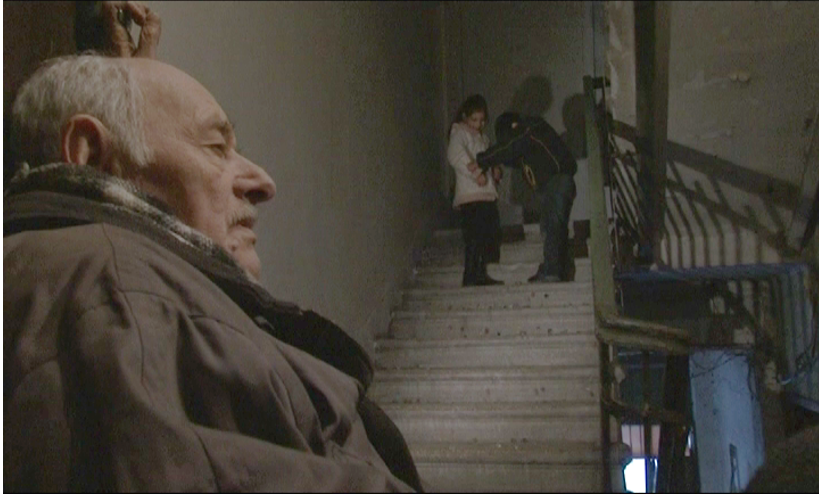Alienation in the family is a familiar topic for Georgian cinema. Guram Bakradze's student film, "Dad" (2014) also deals with this topic. It is worth noting that the director told us this problem succinctly, sequentially but without many question marks. The work is devoid of useless details and the attention is focused only on those moments that the director needed for a specific purpose.
There are only three main characters in the film, who represent the typical images of Georgian society. The dad, Gurami (Davit Bakhtadze) is burdened with responsibilities. There is a long distance between him and his son. The only thing that brings them together seems to be blood; the son, Sandro (Daniel Adikashvili) does not understand his responsibilities. He knows that every mistake he makes will be corrected by someone (in this case, his parents); the mother (Tamar Mamulashvili) is a figure who is inactive. She might want to be active but she can't. She is not strongly involved in the events.
"Dad" is a film that has a clear, well-chosen story beginning and a logical end time in the life of little people. The movie stops when the story actually ends and what happens after that is another adventure. At the beginning of the film, we can see a father taking his son out of prison. Parents send their son abroad to protect himself from danger, but Sandro wants revenge.
The central figure of the film is the father, and his portrait is drawn most vividly. Each action is followed by Guram’s evaluations, which the director reflects both in a verbal and behavioral ways. Every step of this character is governed by that abstract and unbearable phenomenon called fear. This fear seems to appear as a fourth character. It follows the main character, who can escape from it. In almost every episode, it can be seen how the space is filled with the expectation of danger – the person sitting in the car has disturbing thoughts that follow and watch him. The tension completely captures the screen when the husband and wife sitting at the table hear the bell, a few moments of silence and petrification make us feel the anxiety that their minds and bodies are going through. Particularly tense is the scene in which the lights and sound of a police car enter the bedroom. If the audience is more in the mode of anticipation and interest in the two episodes mentioned above, in the latter case, the audience might be tensed, even scared.
On the other hand, it remains to be seen what causes such a special fear? The decision that the father makes – he takes his son out of prison, lets him go abroad, tells him how to behave – is like an automatic action, that is, he saved his son not because that he wanted to do so but because he is a father and is obliged to do so – "You know what? It really seems to me that you didn't want to take him out" – Guram's wife addresses Guram with these words.
However, why should the father not be able to get his son out of prison? One fact is that Guram took this decision thoughtfully. He sold the factory, planned and calculated everything. And it is also a fact that the son should not suffer, but still there is a stagger in his steps, which causes mistrust. The father does not trust his son, he does not believe Sandro. In this episode, we return to the family estrangement that was mentioned at the beginning – the father did not know his son, the son committed a crime, from now on the father looks at him with suspicion. The only thing this character is completely sure of is fear, the fear of what might happen, and by the end of the film, we really see that feeling vindicated.
Despite his fear, Guram has great strength and endurance. He is under serious psychological pressure. Nevertheless, he maintains self-control as much as possible. There are some explosions in his mind, but he is silent. And the more he stays silent, the more pressure he feels is readable. It must be said that this effect was achieved by Dato Bakhtadze’s performance. A special challenge begins in the finale of the film. When Guram enters the hallway and hears the conversation between his son and his friend, he hesitates for a second and walks slowly. He has a lot of thoughts brewing in his head, he has a premonition of what he's going to do shortly, and this makes his movement automatic (he walks towards the door and ignores or might not even hear the "hello"). The final strongly expressed emotion we can see is the father's tense face: eyes downcast, lips pursed, tightly clutching the pillow. After that it seems to disappear. He follows the fear that has passed, and in this emptiness, the sound of gunshots is heard as a loud chord.
Father had been afraid of this, of this last voice. He felt, or at least "anticipated" this end in some thoughts. He didn't want the story to end that way but the film doesn't show any resistance either. It seems that what happened was inevitable – terrible, but inevitable.
Gvantsa Nozadze






